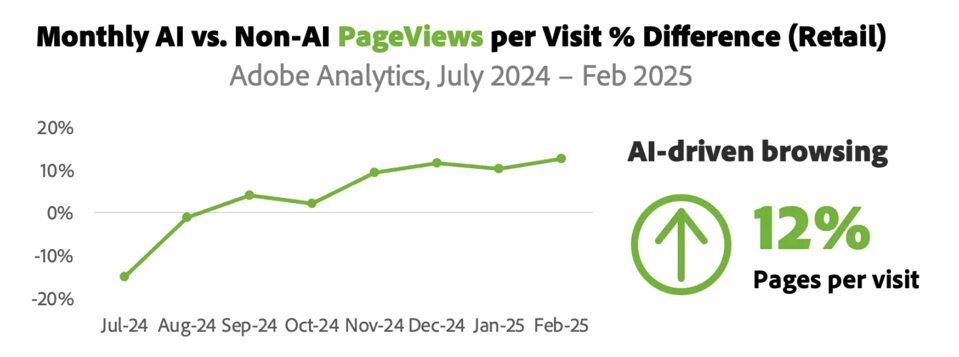Imagine discovering that 40% of your potential customers never see your website, never click your ads, never even know you exist because an AI answered their question first. This isn’t fiction, it’s happening today: traffic to company sites has dropped up to 30% as consumers skip Google for ChatGPT. But here’s what separates tomorrow’s market leaders from today’s casualties: In a world drowning in AI-generated sameness, your brand becomes the life raft. When machines evaluate options for humans, only brands that have prepared for an AI-first world will thrive. The rest become invisible.
The AI opportunity most brands are missing
Yes, Google’s market share dipped below 90% for the first time since 2015. Yes, AI chatbots processed 55.2 billion visits last year. But here’s what most people aren’t realizing: AI doesn’t replace brand value – it amplifies it.
The data confirms this opportunity: A recent Bain report sited that while 80% of consumers use AI for search, conversion rates through AI-powered discovery are already 2x higher than traditional Google search for certain categories. Adobe reports AI-referred traffic to retailers exploded 1,200% between July 2024 and February 2025.
Why strong brands win the AI algorithm game
Here’s the counterintuitive truth: As AI generates more content, brand differentiation becomes more valuable, not less.
Why is that? Large language models trained on billions of web pages naturally develop preferences for established, trusted brands. When asked for recommendations, ChatGPT doesn’t randomly select options – it synthesizes patterns from authoritative sources, reviews, and expert opinions. Strong brands dominate these training datasets.
Companies will increasingly get new customers directly from AI-driven recommendations. A brand’s success won’t happen by chance, but rather the result of deliberate brand-building strategies that work with AI, not against it.
The playbook for AI brand dominance
1. Structure your content for LLM comprehension
Forget keyword stuffing. AI models value:
- Structured data markup: Implement schema.org vocabulary comprehensively
- Clear hierarchical information: Use nested headers (H1-H6) logically
- Explicit definitions: Include glossaries and FAQs in natural language
- Authoritative citations: Link to and from high-domain-authority sources
Brands implementing comprehensive schema markup will see higher inclusion rates in AI-generated responses.
2. Build your Answer Engine Optimization (AEO) strategy
Traditional SEO metrics become secondary to new KPIs:
- AI mention share: Track brand appearances across GPT, Claude, Gemini
- Context quality score: Measure sentiment and accuracy of AI mentions
- Recommendation rate: Calculate percentage of category queries including your brand
- Attribution accuracy: Monitor if AI correctly describes your offerings
3. Create AI-specific content assets
Develop content explicitly designed for AI consumption:
- API documentation that LLMs can parse for real-time data
- Structured comparison tables versus competitors
- Use-case libraries with specific problem-solution pairs
- Technical specifications in standardized formats
4. Deploy brand-authentic AI agents
Instead of generic chatbots, create AI representatives that embody your brand:
- Voice consistency: Train on your company’s content to ensure your brand voice
- Value alignment: Encode your brand principles into agent behavior
- Expertise depth: Specialize in your domain rather than generalizing
- Proactive engagement: Initiate helpful interactions, don’t just respond
5. Prepare for agent-to-agent commerce
The future isn’t just AI talking to humans – it’s AI marketing, negotiating, selling, and servicing with AI:
- Develop agent APIs: Enable programmatic access to inventory and pricing
- Create negotiation parameters: Set rules for AI-to-AI transactions
- Build authentication systems: Verify legitimate agent interactions
- Design feedback loops: Learn from agent-to-agent outcomes
Measuring success in the AI-first world
Traditional metrics need AI-era upgrades. Instead of just tracking organic search rankings, click-through rates, and time on site, start measuring the AI metrics that matter such as AI recommendation frequency, brand authority score in LLM responses, AI agent-assisted conversion rates, cross-platform AI mention sentiment, and zero-click value capture.
Now is the time to start your brand’s AI-readiness plan.
- Audit your AI visibility: Use tools to benchmark current AI mentions.
- Implement technical foundations: Deploy schema markup and structured data.
- Create AI-optimized content: Develop comparison guides and use-case libraries.
- Launch brand AI agents: Start with something that will have an immediate impact in an area of customer acquisition or customer retention.
- Measure and iterate: Track the new AI-focused KPIs and optimize based on the data.
The choice is binary: Either your brand becomes the default AI recommendation in your category, or your competitors will. In a world where content is AI-generated and there’s a sea of sameness, your brand isn’t just your differentiator – it’s your survival strategy. The companies investing in AI brand dominance today will own the customer relationships of tomorrow.

